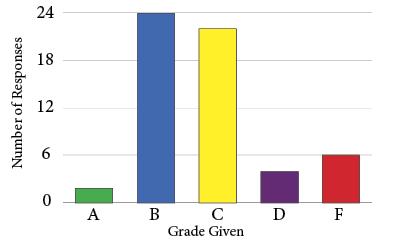Community grades safety and security’s performance
On Oct. 27, Jeff Schneider, former director of Allegheny College’s safety and security, left his position. Sean Kennedy, who has been hired by the college as the interim director, began his job on Nov. 9.
“We have a moment here,” said Allegheny College President James Mullen. “We have new leadership in the office, and I think he’s anxious to hear people’s sense of the office.”
While Allegheny was without a director of security for nearly two weeks, the school did not announce either the departure of Schneider or the hiring of Kennedy.
Mullen said that the college does not announce personnel changes, and could not provide a reason for Schneider’s departure.
Students, however, raised concerns that the college did not announce Schneider’s departure from Allegheny, seeing examples of previous instances of personnel changes about which Allegheny notified students.

The Campus conducted a poll for Allegheny community members asking them to give a letter grade to campus security. The poll was opened on Nov. 4 and closed on Nov. 15, 2015 at 2 p.m.
“We should be able to understand everything that’s going on on campus,” said Levi Lundell, ’17.
Schneider’s departure comes amid student concerns over the effectiveness of Allegheny’s security office.
In a poll conducted by The Campus last week, 41 percent of respondents gave the office a grade of a “B,” signifying that the office’s response speed was expected and the officers were helpful. Nearly 40 percent said the office had a response time that was slower than expected while still being helpful.
“I’m concerned,” said Interim Dean of Students Jacquie Kondrot. “Those aren’t the grades we want.”
Safety and security employs 12 officers, eight of whom are employed full-time, three phone dispatchers and three communications officers, according to its 2015 Annual Security Report. The office, however, employs no female officers.
“That’s an area where we need to improve,” said Mullen.
Both Mullen and Sue Steubner, the college’s executive vice president, said Allegheny works to attract female and minority applicants when the office has an opening. Despite these efforts, safety and security remains relatively homogenous.
Students also raised concerns over the effectiveness of safety and security’s system of responding to incidents in the survey. While emergency responses dispatch an officer when a call is placed, some students believe dispatchers hold a subjective power of determining whether or not officers will go.
“If the dispatcher decides that [an incident]’s not an emergency,” said Lundell, “then I can’t get it past them. I can’t talk to anyone else in the office.”
Lundell and Andrew Skelly, ’17, encountered a person on campus during the summer who asked them to accompany her to Women’s Services. This situation made them uncomfortable, said Lundell, so they called security.
“They pretty much said there’s nothing they could do about it,” said Skelly.
Security does not offer escort services for people who are not members of the college community, but Skelly believes this should not prevent the office from at least investigating the situation.
“You’d think if the students felt harmed or unsafe by anything, security could come and help them,” Skelly said.
Allegheny has a cooperative agreement with the Meadville City Police Department, written in 2005 and revised in 2014, available on the college’s website, that broadly lays out the abilities of both security and Meadville police while on campus.
According to the agreement, college officers are required to call Meadville Police for assistance with assaults, all felonies and drug offenses involving drugs other than marijuana. Additionally, while security has the power to arrest, as well as to investigate any criminal instance on campus, the agreement requires security to call police for help with any hostile person on campus.
College administration has taken steps to ensure both security and the administration are both aware of what roles security plays on campus.
“We’ve worked really hard the last 18 months to clarify our roles and responsibilities,” said Steubner.
In addition to concerns over security’s role, survey respondents found issue with how officers questioned students.
Kondrot said she was disappointed to hear that students have had bad experiences with security.
“I’m very concerned that students feel they are not being respected,” said Kondrot.
Some students who responded to the survey raised concerns over response time. Of the survey’s respondents, 55 percent gave a grade indicative of a speed that was at least “slower than expected.”
Not all survey responses recorded negative experiences with safety and security. Students expressed positive encounters as well.
“It’s just this one incident, because I’ve had fantastic interactions with security as well,” said Lundell.
Administrators also have high hopes for the future of safety and security under a new director.
“I’m very confident in the leadership that’s in there now,” said Mullen.







